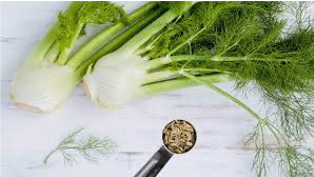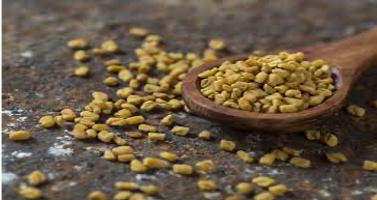Brought to you by our resident food finder Krissy Biliczky
Today’s Herb is Fennel
 Foeniculum vulgare, commonly known as fennel, is a flavourful culinary herb and medicinal plant.
Foeniculum vulgare, commonly known as fennel, is a flavourful culinary herb and medicinal plant.
Fennel plants are green and white, with feathery leaves and yellow flowers.
Both the crunchy bulb and the seeds of the fennel plant have a mild, liquorice-like flavour. The flavour of the seeds is more potent due to their powerful essential oils.
Aside from its many culinary uses, fennel and its seeds offer a wide array of health benefits and may provide antioxidant, anti-inflammatory, and antibacterial effects.
Science based health benefits of fennel:
- fresh fennel bulb is a good source of vitamin C, a water-soluble vitamin critical for immune health, tissue repair, and collagen synthesis
- all parts of the fennel plant are rich in powerful antioxidants like chlorogenic acid, limonene, and quercetin — all of which may benefit health
- fennel seeds may reduce appetite
- fennel and its seeds contain fibre, potassium, magnesium, and calcium — all of which are essential for good heart health
- may have cancer fighting properties – due to anethole — one of the main active compounds in fennel seed
- may help increase milk secretion and blood levels of prolactin — a hormone that signals the body to produce breast milk
- may reduce inflammation due to its high anti-oxidant properties
- may relieve menopausal symptoms
Fennel is available as a fresh bulb, essential oil, seeds and extract.
Though fennel and its seeds are likely safe when eaten in moderation, there are some safety concerns over more concentrated sources of fennel, such as extracts and supplements.
- For example, fennel has strong estrogenic properties, meaning that it acts similarly to the hormone oestrogen. While this may help with menopausal symptoms, it may be unsafe for pregnant women.
- Fennel may also interact with certain medications, including oestrogen pills and certain cancer medications, so always consult your healthcare provider before using high doses in supplement, essential oil, or extract form.
Today’s spice is Fenugreek seeds
 Fenugreek (Trigonella foenum-graecum) is a plant that stands around 2–3 feet (60–90 cm) tall with green leaves, small white flowers and pods that contain small, golden-brown seeds.
Fenugreek (Trigonella foenum-graecum) is a plant that stands around 2–3 feet (60–90 cm) tall with green leaves, small white flowers and pods that contain small, golden-brown seeds.
It is also referred to as Methi dana.
For thousands of years, fenugreek has been used in alternative and Chinese medicine to treat skin conditions and many other diseases.
Recently, it has become a common household spice and thickening agent and can be found in soap and shampoo as well.
It is widely used in Ayurvedic medicine especially as Fenugreek infused water.
Fenugreek seeds and powder are also used in many Indian dishes for their nutritional profile and slightly sweet, nutty taste.
Scientific research is limited but Earl Grey tea is thought to have the following benefits:
- May be a safe natural alternative to encourage breastmilk production
- may boost testosterone levels in men
- may help control both type 1 and type 2 diabetes and also helps increase carb tolerance in people without diabetes
- may help blood sugar as it improves insulin function
- may help appetite control
- can help lower cholesterol and triglyceride levels
- can help with digestive problems and kidney ailments
- it has been known to be used as poultice – this means it is wrapped in cloth, warmed, and applied directly to the skin to treat local pain and swelling
- can help with bloating and water retention
Fenugreek appears relatively safe for healthy people.
However, as with most supplements, less serious side effects like diarrhoea and indigestion have been reported anecdotally.
Given its effect on blood sugar, fenugreek should be used with caution for those on diabetes medication or other supplements for lowering blood sugar levels.
If in doubt, as ever, please seek advice from a healthcare or medical professional.
